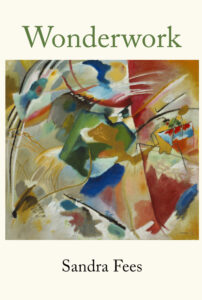 Review by Sharon Tracey
Review by Sharon Tracey
From the Latin ministerium comes the word ministry: the service and work of providing assistance and care. And in her engaging new collection, Wonderwork, poet and Unitarian Universalist minister Sandra Fees invites us to bear witness to a spiritual journey as she questions and contemplates different ways of seeing, being, and ministering to inner and outer worlds. As she writes in “Inner Cosmology” (p 54): “I pick up sticks the winds tore down / in the aftermath of other people’s storms.” Work that calls her back “to what I once loved.” Herein lies the wonderwork.
Fees infuses her poems with bolts of color. She sets the stage with a Kandinsky painting that graces the book cover, “Painting with Green Center,” which brings to mind his groundbreaking treatise, Concerning the Spiritual in Art. From “pink profligates” to a “blue-green warning,” from self-portrait as “flame” to “bioluminescence,” Fees strings poems and questions of purpose and meaning like colored beads, marked off one by one by the noticing. “In pursuit of the last cultivar” (p 59) Fees observes a plucked cluster of spiked mulberries and sees sacred relics. The purplish mulberry fruit also hints at the hue of the heart if one were to mix the venous and arterial.
And how apt for a minister-poet to evoke the throat as a central vehicle and force for channeling ruminations on faith as Fees writes in “Self-Portrait as Seed, Plow, Prophecy” (p 22):
Because I do not know how to be feral
sowing lemon balm to save the world
because I do not know how to feather
a nest or make peace that will last
I try to break open my mouth like first light.
…
I let the throat be seed, plow, prophecy—
Seeds, the ripened ovules for sowing. A plow for words to cut, lift, and turn. And the possibility of prophecy, of what might come, what kingdoms.
And later in “Self-Portrait as Container,” (p 66) the throat again: “My throat’s blown glass / would choir a sunflower cluster.” Blown glass luminescent, the opposite of broken. Choir as a verb of propulsion. Clustered sunflowers that might be congregants stirring in pews. This is vivid, thought-provoking imagery that offers shafts of both doubt and faith filtered as if through a church stained-glass window.
We also follow the arc of the minister-poet’s journey through poem titles, with flashes of detail as if a highlight reel as she unspools a story that is both personal and universal. Take for example, “I’d like to believe its existence means something,” (p 49), which finds the poet out walking and coming upon a pale blue egg on the sidewalk, delicate and vulnerable, which she compares to a “mouth: O.” Offering up the throat again, and maybe a reminder that poetry yearns to be heard (like a sermon) as well as read and felt in the bones. Be a voice that calls out in song, sometimes confident and light and sometimes difficult and dark, as she titles one poem, “My job follows me like a street dog,” (p 25).
In “This Coming Home to the Absence” (p 55) Fees considers how we never really leave the home of self. “Back home celosia’s plumes. Isn’t that / what hope is, too?—an upward spire.” And as I write these words, I think of the miraculous reconstruction of Notre-Dame, the new spire’s gleam, its pinnacle cloaked in cloud then burnished by sun as the cathedral opens again, rising from the ashes after five long years. And the poet offers more in “Wild Hope” (p 67):
…the milk-white altar, the page’s
perilous blankness, what I call
my private forgetfulness.
Virginia Woolf calls it
cotton wool, this non-being—
each moment that contains
more gauze than flowering
until without warning
an abrupt wheeling.
Bees where there
was only air. A crinoline
poppy…
In “ Groundwork” (p 64) the poet reminds us “It is impossible not to have a body.” A foundation, a cornerstone to anchor inner and outer worlds, provide a landscape to tend to. A place to contemplate and undertake the “Wonderwork” (p 74), where Fees leaves us with questions, acknowledging the great unknowing. Leaves us with: “the uncloaked goddesses of the deepwood” and their “serpent branches / twisted into impossible lattices.” Leaves us with: “maybe I am wrong, / after all, to think they required no maker.” Leaves us with these final words: “made to wonder what else we might have been, /whether we are good for more than our bareboned selves.”
____________________________________
Wonderwork by Sandra Fees
BlazeVOX [books], 2024, $18.00 [paperback]
ISBN: 978-1-60964-477-2
Sharon Tracey is a poet and editor and the author of three books of poetry: Land Marks (Shanti Arts 2022), Chroma: Five Centuries of Women Artists (Shanti Arts 2020), and What I Remember Most is Everything (All Caps Publishing 2017). Her work has appeared in Radar Poetry, Terrain.org, Lily Poetry Review, The Ekphrastic Review, and elsewhere. She previously served as a director of research communications and environmental initiatives at the University of Massachusetts Amherst.
